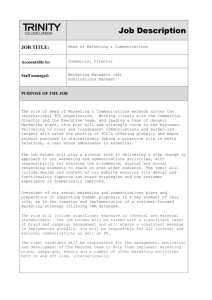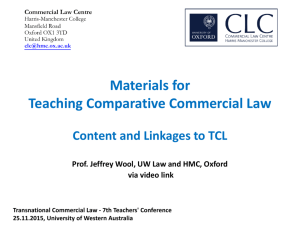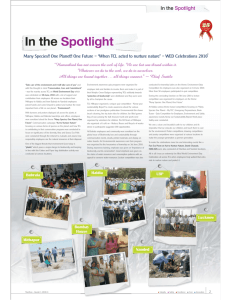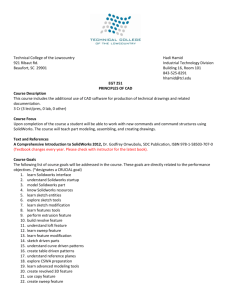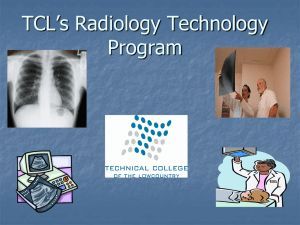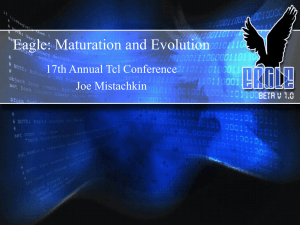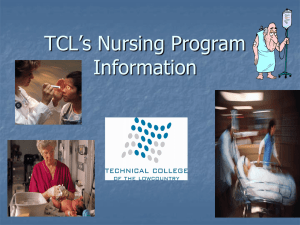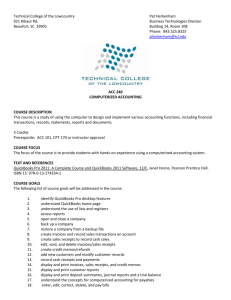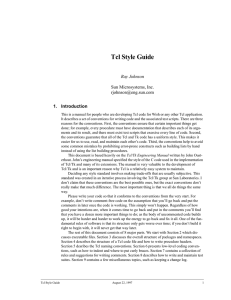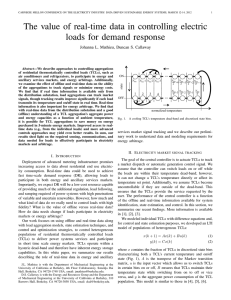Remote Control of Test Equipment Using Distributed Objects
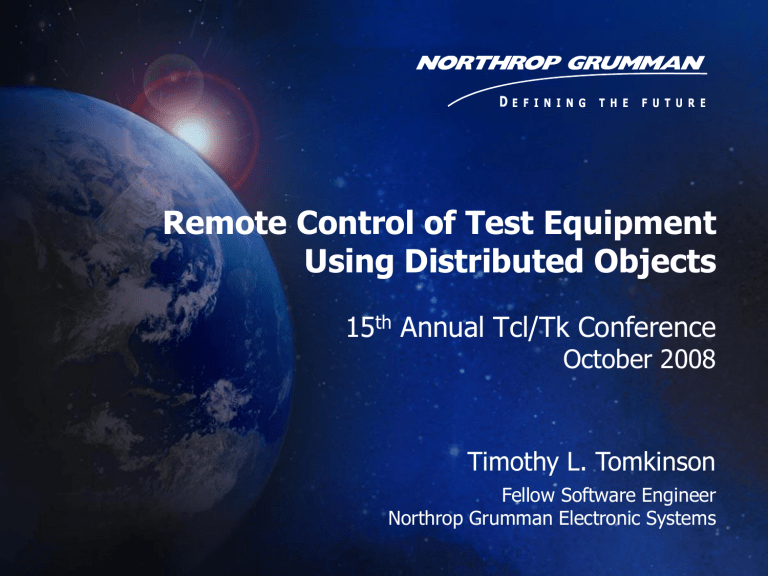
Remote Control of Test Equipment
Using Distributed Objects
15
th
Annual Tcl/Tk Conference
October 2008
Timothy L. Tomkinson
Fellow Software Engineer
Northrop Grumman Electronic Systems
2
Agenda
• My Background
• Problem: Controlling Complex Test Stands
– Communication between network nodes
– Hardware control
• Networking Solutions
– Custom middleware
– Off-the-shelf solution using CORBA
– Tcl solution using distributed objects
• Hardware Control
– Tcl and Ffidl
• Example
• Conclusion
3
My Background
• Education
– B.S. Electrical Engineering: Carnegie Mellon University
– M.S. Computer Science: Johns Hopkins University
• Air Force: 5 years
– Satellite Software Engineer
– DMSP: Weather Satellites
• Northrop Grumman: 14 years
– Embedded, real-time software
• VxWorks
• VME, CompactPCI
• C/C++
– Test Software
• Windows, Unix, VxWorks
• Ethernet, GPIB, RS-232, 1553, USB
• Tcl, C/C++, SQL
• Tcl User: 10 years
Typical Test Stand
4
CompactPCI
Database
VME
Ethernet
GPIB
Control PC
PCI
RS-232
USB
1553
Operator PC
5
Custom Middleware
• Create custom client/server applications
• Need to know network programming on different platforms
– Steep learning curve on some platforms/languages
• Need to define network protocol and message structures
– Separate code required to encapsulate and extract messages
– Tedious to maintain
• Expensive
# Power Supply Message typedef struct
{
MessageId msgId;
PowerSupplyId psId; float voltage;
} PowerSupplyMsg;
6
CORBA
• Common Object Request Broker Architecture
• Platform-independent infrastructure for communicating over a network
• Messages are defined using a generic Interface Definition Language
(IDL)
• IDL compiler generates client and server objects
• Client object used to connect to server object and execute remote method calls
• Method arguments, return values, and exceptions are encapsulated and extracted automatically according to IDL
• ORB (Object Request Broker) provides main event loop processing and message dispatching
• Complicated/expensive
7
CORBA Architecture
Client (Operator PC)
Stub
Class
Interface
Definition
(IDL)
IDL Compiler
ORB
Network
Server (Control PC)
Skeleton
Class
Implementation
Class
ORB
8
Tcl Distributed Objects
Client (Operator PC)
“Remote”
Class
Local
Object
Network
Server (Control PC)
“Remote”
Class
Target
Object
• “Remote” class manages infrastructure
• Target object created on server
• Introspection used to generate local object
• Local methods and procedures replaced with remote method calls
• Operations on local object transparently executed on target object
9
Advantages
• No IDL compiler
– Client and server objects created at runtime from single Itcl class
– Same language on both ends
– Introspection
• No ORB
– Network communication managed by “comm” package
– Message dispatching managed by Tcl interpreter
– Event loop managed by Tcl event loop
• Transparency
– Itcl class does not need to be modified to run remotely
– Other than startup code, client app is not aware that local object is running remotely
10
Hardware Control
• “Ffidl” package used to call shared libraries
– Foreign Function Interface with Dynamic Loading
– Tcl extension on top of either “libffi” or “fficall”
– Creates Tcl commands that map to functions in shared libraries
• DLLs (Windows) or shared objects (Unix)
• Custom or COTS
• Examples: Win32, NI-VISA, 1553, VME, PCI, etc.
– Eliminates need to write Tcl extensions
– Ported to VxWorks
• Uses VxWorks symbol table
• Allows direct calls to kernel and user modules
• Wrapper class created for each library to provide object-oriented interface
11
Hardware Control (cont’d)
Test
Script
Device
Driver
Library
Wrapper
Ffidl
Shared
Library
Test scripts written in procedural Tcl
Device drivers written in object-oriented Tcl
Library wrappers provide OO interface to shared libraries
Ffidl acts as bridge between Tcl and C
Shared libraries: DLLs or shared objects, custom or COTS
Device
Hardware device
Device Driver Classes
12 class PowerSupply { package require NiVisa ;# library wrapper
# Command table (method vs. command string) foreach {method cmdStr} { reset *RST voltage VOLT
...
} {
# Create write methods public method $method {args} \
“eval handleWrite $cmdStr {$args}”
}
# Write to device private method handleWrite {args} {
$niVisa write $args
}
}
# Example
$ps reset
$ps voltage 5.0
• Command table contains method names vs. command strings
• Initialization code creates public methods for each command
• Public methods call the same private method to write to device
• Same concept used for query commands
13
Example
• Server side
# Start the server package require Remote
Remote::config –port 5000 –local 0
• Client side
# Create instance of “Remote” object package require Remote set remote [Remote #auto $hostname 5000]
# Use “send” method to load package
$remote send “package require PowerSupply”
# Use “new” method to create object set ps [$remote new PowerSupply]
# Call methods
$ps reset
$ps voltage 5.0
14
Conclusion
• CORBA paradigm very easy to implement in Tcl
– Itcl provides all necessary object-oriented extensions
– Tcl’s introspection facility eliminates need for interface definition file
– Comm package provides robust remote procedure calls
• Ffidl is perfect for controlling hardware
– Easy to call C libraries without writing Tcl extensions
– Can use existing device drivers, either COTS or custom
• Tcl’s portability allows seamless control across multiple platforms
• Distributed object architecture provides rapid development
– Code can be tested and debugged on local PC
– To deploy, only a few extra lines are required to run remotely
– No knowledge of network programming is required
– Since code does not need to be modified, any Itcl object can be run remotely
• Fast, simple, inexpensive
15
